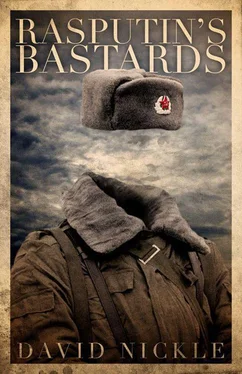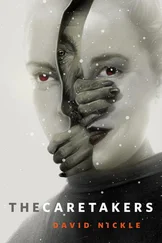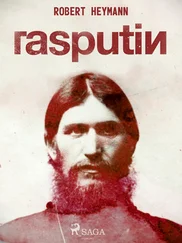Alexei turned and leaned against the tank. “What do you mean by that?”
“At the dance,” said Darya. “We’ll all lose our heads to Babushka.”
“I think,” said Alexei slowly, “I may have just been speaking with her.”
“How fortunate for you.” Darya gave him a sceptical look. “Maybe you will lose your head to her sooner. That is why I thought you might like to—”
Alexei raised his hand. “Right. I am flattered, Darya. But no thank you. It would be a distraction.”
“You’re the sort of fellow who never does anything, aren’t you? You never take any risks — and you hate distractions.” She looked at him, and Alexei shrugged. “I’m right about that. Like Papa says — I’m getting the sight. Well, Mr. Killer — that kind of thinking can’t get you very far in your line of work — now can it?”
Alexei opened his mouth. He didn’t know what to say to that, and was rescued by the sound of the door opening. He closed his mouth and put his hand on the butt of his gun.
“Oh shit,” breathed Darya as a tall, balding man in an overcoat stepped in. He looked around with small, hard eyes. Three others — a man, and two women — jostled in behind him. By the sounds of things, more were waiting to come through outside. “Papa.”
“Papa?” said Alexei.
“Hide!” she hissed. “We’re not supposed to be here. He’ll kill us!”
“Pilgrims!” shouted Darya’s killer father, when the crowd of them had come in. “Welcome to the New Pokrovskoye Museum of Family History! This place has been here as long as we have — and yet like our family here, it grows month by month.” He repeated himself in French, and once more in Russian.
The crowd nodded at various times. By the time they were all inside, Alexei counted at least thirty. They shuffled down the steps and gawked at the treasure like retirees on a bus tour. But it wasn’t just retirees. Old men and women tottered alongside athletes who couldn’t have been older than twenty. A fat man with greased-back blond hair and a sweaty blue T-shirt was pointing out the intricacies of a glass-domed clock to a young red-haired beauty in a dark blue denim jacket. Two angular black-haired men, so similar to one another they might have been twins, wandered toward the eggs. One of them wore the black and white collar of a clergyman. His brother just wore shorts and a T-shirt, and a dumb, happy grin. Of them all, just one — a short, swarthy man who lingered near the door, glancing over his shoulder like he was expecting someone to check for his ticket — didn’t appear to be having the time of his life.
Alexei pulled back behind the curtain, and whispered to Darya: “We can’t stay here. We’ll turn up.”
“Papa will kill us!”
“Really? Like—” Alexei drew his finger across his throat and raised his eyebrows in a question. Darya shrugged.
“That’s what he used to do,” she said matter-of-factly.
Alexei looked back — this time paying closer attention to Darya’s dad. He had to admit, it was possible. The old man moved in and around the displays with the ease of a jungle cat, his tiny cool eyes unblinking. He wasn’t a young man — what was left of his hair was bone white, and his face was a map of wrinkles — but Alexei didn’t think there was anything but bone and muscle underneath that coat. He appended the thought: bone, muscle, and a small arsenal of assassin’s tools.
Alexei shook his head. That was silly. He was just an old guy who owned a general store, and was right now explaining about the significance of the samovars — which nobleman had made his tea in which of the little tanks, at around about what time period.
“I look at you and I can see — now you wonder,” said Darya’s father, “how this is Family history and not merely a store of antiquities? Tell us, Orlovsky. Are we all descended from the Czars? The cousins of little Anastasia, who fled the Bolsheviks’ bullets? Is this our heritage?”
Darya’s father smiled sadly. He shook his head. “No,” he said. “We are ordinary folk in this room. Our grandparents were more likely to be peasants than kings. They did not, in all likelihood, even know one another in their times. And yet — this is your heritage. It will become your heritage.”
As he spoke, Darya’s father walked over to the case of eggs. Alexei pulled back from the curtain, crawled around to the other side of the space there, and peered out through another crack.
“Your treasure,” he said. “For there are others, who dream us. These ones — these ones are the true Family. Descended from the Holy Man Grigor Rasputin, yes?” Darya’s father’s laugh was a cold razor in his throat. “He who healed the Romanovs and foretold the future — who dreamed and saw the world through God’s eye. And yes — He who spread his seed through the country, to make the Family.
“Rasputin’s bastards, they called them! They have dwelt in our dreams and guided our lives. They are as angels to us. And tonight—”
His grin was wide as he spread his arms.
“—tonight, they give you this!”
Alexei scanned across the faces of the old man’s audience. There was not a hint of skepticism in the room; not even rolling eyes at the rich, carnival barker’s hyperbole that Darya’s father was spewing. They just watched him, nodding, and followed the sweep of his hands as he guided them to look upon the scimitars and the clocks and the china, that according to Darya the Koldun Vasili Borovich had brought here on ships many years ago.
“It will begin very soon,” said Darya’s father quietly. “You will hear the song, and then there are the smells, and in a joyful exodus, you will visit Paradise.”
Members of the group looked at one another with broad grins, nodding in agreement. The uncomfortable little man by the door joined in — nodding and grinning even more forcefully than the rest as he moved down the steps, and around a display case outside Alexei’s field of view.
“Soon,” said Darya’s father. “For now — marvel at the treasures of the New Pokrovskoye Museum of Family History. Marvel, children. And savour. For you will remember them, yes? And with them — construct your paradise together. Savour.”
Alexei felt a hand on his thigh. Darya leaned close and whispered in his ear: “Savour me.”
Alexei looked at her, and glanced above — where the Babushka’s great egg loomed, like a terrible cloud. He thought he could hear a clicking sound — a bonging, as if a great thing shifted in there.
“I don’t think—” he whispered, but she interrupted him:
“Savour me, or I’ll scream.”
Alexei looked at her.
“You won’t scream. Your Papa would kill us both.”
She sighed. “I thought we had a date,” she whispered.
“Pretty exciting date already.”
“Alexei.” Darya shifted so her flank pressed against his. He felt her hip against him. “Please. Just hold me if you don’t want me. I want to feel a touch. Before—”
Alexei put his hand on her shoulder. It was clammy with fear sweat. “Before what? Rapture?” he whispered.
“ Rapture .” She uttered it as a curse. “Yes. Before that particular wonder.” She looked at him pleadingly. “I am young, Alexei. I don’t want to vanish like the others.”
Alexei nodded. “All right,” he said, stroking her hair. “All right.”
The lighthouse’s aerie was day’s last refuge in New Pokrovskoye. Golden sunlight would catch there before nightfall — and thus trapped, would flit like a moth about the complicated rigging of reflectors and lamps to send phantoms of illumination cascading down to the dark pit of the lighthouse’s base. To the eyes of Holden Gibson, it made the great round room look a bit like a disco.
Читать дальше












